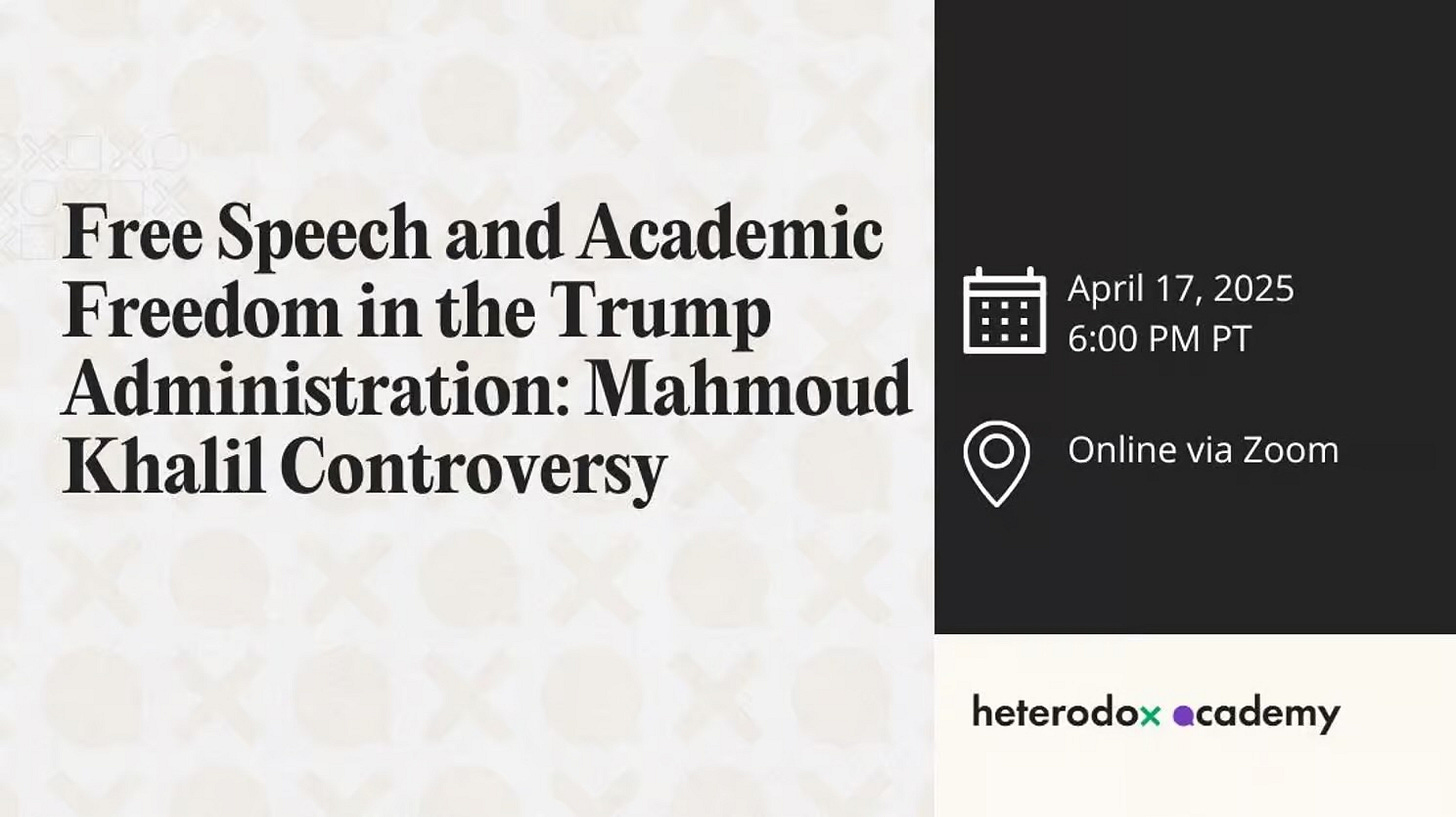Freeing science from bureaucracy
Science is bogged down by a bureaucratic burden; close reading an open letter; and upcoming events.
We’re attempting to cover everything we can with the flurry of higher education and USC news, but if we’ve missed something or you have feedback please reach out to us at heterodox.usc@gmail.com. Please also reach out if you’d like to get more involved with our group.
Death by Bureaucracy
Since Trump’s arrival in the White House, his administration has been directing their attention towards higher education and scientific research, slashing overhead rates on federal grants, enacting layoffs in funding agencies, suspending operations at the National Institutes of Health (NIH) and freezing and auditing various programs. All of this has inspired great financial uncertainty and anxiety for universities and academics.
Heterodox at USC member Anna Krylov, USC Associates Chair in Natural Sciences and Professor of Chemistry, sees an opportunity here:
The disruption and uncertainty created by the recent measures are undeniable and cause for concern. Yet, I also see an opportunity to address a deeper systemic problem plaguing science: American science is dying from bureaucracy—and if the DOGE crew can channel their energy into yanking science from the grip of this malady, we will all end up in a better place.
Consider what’s required to submit a recent National Science Foundation proposal, according to Krylov:
The proposal now includes numerous non-scientific documents—the entire package was 64 pages long, of which only 15 were scientific narrative (which included a mandatory Broader Impacts section) and 10 were references. In addition, the proposal must now include:
A mentoring plan (an enumeration of banalities, such as statements of commitment to advise postdocs on which conferences to attend and how to approach the next steps of their career);
A list of the PI’s synergistic activities (describing service to the profession—such as editorial work or conference organizing, which we used to include as a short section in the biographical sketch);
A data management plan (again, a meaningless enumeration of trivialities and platitudes—such as a statement that the researchers will back up their data and share their research results as appropriate);
A conflict-of-interest spreadsheet listing collaborators and former associates in a specific format (mine has close to 200 entries).
And, just submitting the proposal requires a specially trained administrator.
DEI accounts for a not insignificant portion of administrative bloat. However, another contributor is undoubtably the massive scientific bureaucracy which requires special clerks just to fill out forms. Efforts to whack back some of this jungle could be enormously beneficial to science. You can read Krylov’s full piece here:
Open (Letter) Season
The USC chapter of the American Association of University Professors recently presented an open letter to the administration, signed by a little over 280 out of the 75,000 faculty, staff and students invited to sign.
The letter urges USC to (among other things we will get to shortly) affirm its commitment to academic freedom “necessarily including historical or social processes and experiences that have become sites of political controversy (colonialism, race, gender, sexuality, etc).
Our group agrees with the call to protect academic freedom at the university. In fact, we have members serving on the newly formed Provost-Senate Task Force on Academic Freedom and Professional Responsibility.
We’re not convinced, however, that the 280+ signatories here are actually committed to genuine academic freedom. We suspect they are using appeals to “academic freedom” as a means to ensure their progressive viewpoints remain unchallenged campus orthodoxy.
Did any of them raise the alarm when a USC professor was pressured to remove a political sign from his office? How about when a USC professor was suspended from campus after expressing his views on the war in Gaza on the quad? Do they plan to call out the administration for Orwellian forms of student punishment if it’s not their pet cause that a student champions? And are they prepared to hire, publicly support, or invite to campus faculty who espouse views on gender or colonialism that violate progressive shibboleths?
If signatories are prepared to do all of the above, we welcome them as Heterodox at USC members!
Core Values, Rejected!
The open letter also expresses “grave disappointment” that the university has altered DEI verbiage and adjusted DEI offices and staff, issuing a warning about “obedience in advance.” This is an authoritarian “removal of a core value” which sets a terrifying precedent. What other core value of ours could be removed next, at the drop of a hat, at the mere whim of the Orange Putler?!?
We actually wish we shared their conviction that DEI was going anywhere. As we’ve already noted, changes to DEI at USC appear largely surface-level. DEI offices have new names, but the same faces. Acolytes remain fully committed. A recent missive from the USC Staff Assembly stated: “As part of this effort, we want to reassure you that the annual DEI Mixer will continue under a new name but with the same mission of celebrating diversity and fostering inclusivity.”
As for the concern about federal government meddling with a sacred core value of the university, first, the supposed “core value” of DEI at USC is bogus consultant group fakery. Secondly, enforcing DEI ideology is directly at odds with the academic freedom they also purport to prioritize.
We don’t necessarily blame them for not realizing that DEI has been extensively panned. As Lee Jussim noted recently, defenses and justifications for DEI ideology are already widely promoted at universities. At USC one can check out the USC Race and Equity Center’s National DEI Defense Coalition page for ample information.
What USC doesn’t provide is a platform for criticisms of DEI or any of the data that contradicts the idea that DEI is helpful for institutions. (Would our signatories tolerate a USC website containing that sort of information? Inquiring minds wish to know!) You can find all that compiled here thanks to Lee.
We encourage everyone to read through this and ponder whether, in fact, we should actually do a bit more than just shuffle DEI employees around. Thankfully, all of this was not put down on official USC letterhead, which has been an ongoing problem with open letters at USC over the years.
“DEI” as We’ve Known It is Being Dismantled. What Comes Next?
Wednesday April 16 at 12pm EST | Register here»
Across the U.S., state and federal legislation and regulation is reshaping diversity, equity, and inclusion (DEI) initiatives in higher ed hiring, on campuses, and even in classrooms. As institutions navigate these shifts, how can we continue to foster diverse viewpoints and inclusive environments without instituting political litmus tests?
Join Heterodox Academy for a discussion on the future of DEI. Moderated by HxA’s Managing Editor and Senior Scholar Alice Dreger, and featuring Peter Newton of University of Colorado Boulder, Paolo Gaudiano of Aleria PBC, and Rachel Altman of Simon Fraser University, this panel will explore academic research on DEI, how DEI is evolving in both the US and Canada, and practical alternatives to traditional “DEI” that align with the core values of higher education.
Free Speech and Academic Freedom in the Trump Administration: Mahmoud Khalil Controversy
Thursday, April 17 at 6pm PST
Join the HxEast Asia community for a virtual discussion on Mahmoud Khalil's case and global implications of the Trump administration's policies. You'll hear from speakers including Jonathan Zimmerman of the University of Pennsylvania, Shai Davidai of Columbia University, and Joseph Yi of Hanyang University. This event is free and open to the public. Please register in advance. You can contact Joseph Yi at joychicago@yahoo.com with questions.
Register and more information»
If you have an upcoming event that may be of interest to our readers, please contact us at heterodox.usc@gmail.com.
Interesting News and Research from USC
USC scientists find a gut-brain link that may affect behavior in children with autism
USC professor uncovers new path to understanding black holes
Expert USC testimony: film industry incentives don’t justify the cost
Trojans find community through Swim with Mike program
USC study reveals how nostalgic music helps minds remember
America's favorite sweetener may have hidden cost, USC scientists find
We welcome your news, opinions, and responses. Please contact us at heterodox.usc@gmail.com. We’d also appreciate if you forwarded our email to USC faculty, alumni, parents, staff and students who may share our concerns and priorities.









Excellent newsletter!
The AAUP open letter is a sobering exhibit of the essence of the crisis of American higher ed--an ideological rot that spread too deep and too wide. How can we restore the true mission of the university--truth seeking through knowledge production and education--when we have a contingent of faculty who embrace illiberal, discriminatory, and antihumanistic ideology and practices? Their commitment to DEI (Discrimination, Entitlement, and Intimidation) is so strong that they are willing to jeopardize our federal funding for it. Quite telling is the demographics -- the fraction of STEMM faculty among signatories is rather small.